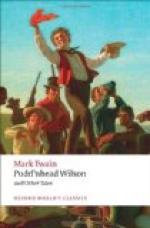“Sick your granny; what’s to make him sick?”
“Oh, there’s never any telling. These foreigners with that kind of names are so delicate, and of course that kind of names are not suited to our climate—you wouldn’t expect it.”
[And so-on and so-on, no end. The time drags along; Thursday comes: the boat arrives in a pouring storm toward midnight.]
At last there was a knock at the door and the anxious family jumped to open it. Two negro men entered, each carrying a trunk, and proceeded upstairs toward the guest-room. Then followed a stupefying apparition —a double-headed human creature with four arms, one body, and a single pair of legs! It—or they, as you please—bowed with elaborate foreign formality, but the Coopers could not respond immediately; they were paralyzed. At this moment there came from the rear of the group a fervent ejaculation—“My lan’!”—followed by a crash of crockery, and the slave-wench Nancy stood petrified and staring, with a tray of wrecked tea-things at her feet. The incident broke the spell, and brought the family to consciousness. The beautiful heads of the new-comer bowed again, and one of them said with easy grace and dignity:
“I crave the honor, madam and miss, to introduce to you my brother, Count Luigi Capello,” (the other head bowed) “and myself—Count Angelo; and at the same time offer sincere apologies for the lateness of our coming, which was unavoidable,” and both heads bowed again.
The poor old lady was in a whirl of amazement and confusion, but she managed to stammer out:
“I’m sure I’m glad to make your acquaintance, sir—I mean, gentlemen. As for the delay, it is nothing, don’t mention it. This is my daughter Rowena, sir—gentlemen. Please step into the parlor and sit down and have a bite and sup; you are dreadful wet and must be uncomfortable —both of you, I mean.”
But to the old lady’s relief they courteously excused themselves, saying it would be wrong to keep the family out of their beds longer; then each head bowed in turn and uttered a friendly good night, and the singular figure moved away in the wake of Rowena’s small brothers, who bore candles, and disappeared up the stairs.
The widow tottered into the parlor and sank into a chair with a gasp, and Rowena followed, tongue-tied and dazed. The two sat silent in the throbbing summer heat unconscious of the million-voiced music of the mosquitoes, unconscious of the roaring gale, the lashing and thrashing of the rain along the windows and the roof, the white glare of the lightning, the tumultuous booming and bellowing of the thunder; conscious of nothing but that prodigy, that uncanny apparition that had come and gone so suddenly—that weird strange thing that was so soft-spoken and so gentle of manner and yet had shaken them up like an earthquake with the shock of its gruesome aspect. At last a cold little shudder quivered along down the widow’s meager frame and she said in a weak voice:




